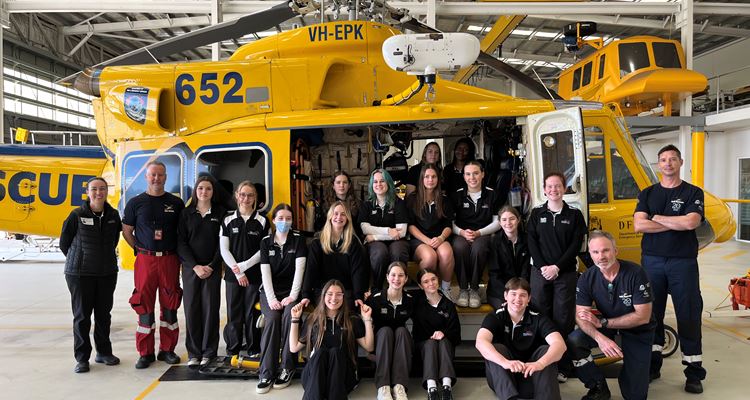Up-and-coming health professionals go behind the scenes of RAC Rescue

Sixteen Year 11 students from Manea Senior College’s Health and Medical Specialist Program (HMSP) recently got a glimpse of career possibilities with our Emergency Rescue Helicopter Service.
The aspiring health professionals got to see the advanced aeromedical capabilities of the RAC Rescue helicopters, which respond to life-threatening emergencies across our State 24 hours a day, every day of the year.
Manea Senior College established the HMSP in 2013 to provide pathways for secondary students into health and medical professions.
Through the program, students gain practical skills and experience in different medical environments and observe health professionals in action.
Susanne Williams who has been teaching the program since 2022 said it was established to help combat workforce shortages in the regional health system.
“The goal is to give students an idea of what it’s like working in health professions before they start a degree,” she said.
“We show them what options are available to them, with an emphasis on regional services, in the hope they return once they have their qualifications.”
The group was guided by the crew through the Bunbury emergency rescue helicopter base, which expanded the service into the South West region in 2016.
RAC Rescue Critical Care Paramedic Allan Newbold, who has been with the service since 2006 and has 25 years of medical experience, showed students the clinical equipment that enables advanced patient care at an incident scene and onboard.
“It is not a commonly known career pathway so it’s nice to be included in a program like this which shows young people what’s out there,” Allan said.
RAC Rescue Critical Care Paramedics are trained to perform advanced medical procedures, often in remote and challenging environments, that go beyond the general scope of practice of paramedics.
They are equipped with advanced training that allows them to make complex clinical decisions without additional medical consultations.
Program participants April Schroder and Vanessa Vincent both have their sights set on paramedicine and were full of praise for the base visit.

Image: April Schroder and Vanessa Vincent in the RAC Rescue helicopter.
“The experience of coming here and seeing what they do and how much they help people around the community was great,” April said.
“I want to be a medical officer or paramedic, and a part of emergency services in some way, so I could see myself doing a role like this in the future.”
Vanessa, who regularly sees the helicopter flying over her house, said it was valuable to walk away with a better understanding of what’s going on inside.
“I thought there would be more people on the aircraft, I was really surprised,” she said.
RAC Rescue Aircrew Officer Glenn Rogan hoped the visit would drive all of the students to keep pushing themselves toward their chosen careers.
“RAC Rescue is quite a specialised area that requires a person to start a career and gain lots of experience to join,” he said.
“These students are at the start of their journey, so we urge them to enjoy it and hope to see them in our health services or on the service in the future.”
RAC Rescue facilitates limited base tours but endeavours to support groups and programs for learning and development opportunities. To enquire, please complete our online Event Request Form.
The RAC Rescue helicopters are funded by the State Government, managed by DFES and sponsored by RAC.

